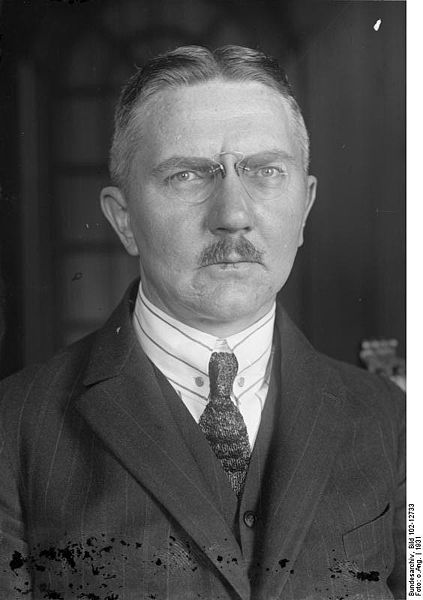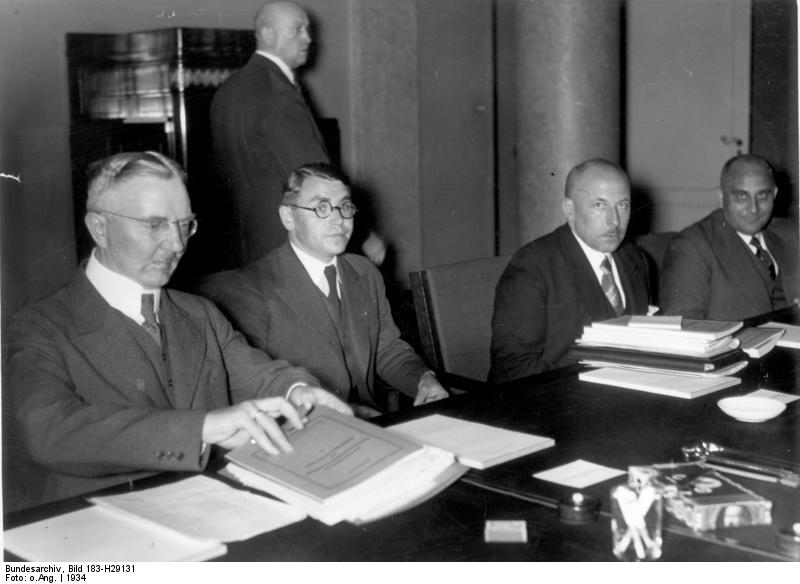<Back to Index>
- Mathematician Frigyes Riesz, 1880
- Architect Richard Upjohn, 1802
- Reich Minister of Economics Hjalmar Horace Greeley Schacht, 1877
PAGE SPONSOR


Dr. Hjalmar Horace Greeley Schacht (22 January 1877 – 3 June 1970) was a German economist, banker, liberal politician, and co-founder of the German Democratic Party. He served as the Currency Commissioner and President of the Reichsbank under the Weimar Republic. He was a fierce critic of his country's post - World War I reparation obligations.
He became a supporter of Adolf Hitler and the Nazi Party,
and served in Hitler's government as President of the Reichsbank and
Minister of Economics. As such, Schacht helped implement Hitler's
policies of redevelopment, reindustrialization, and rearmament. He
was forced out of the government by disagreements with Hitler and other
prominent Nazis in December 1937, and had no role during World War II. He became a fringe member of the German Resistance to Hitler and was imprisoned by the Nazis after the 20 July plot. After the war, he was tried at Nuremberg but acquitted. In 1953, he founded his own bank, and advised developing countries on economic development. Schacht was born in Tingleff, Schleswig - Holstein, Prussia, German Empire (now in Denmark)
to William Leonhard Ludwig Maximillian Schacht and baroness Constanze
Justine Sophie von Eggers, a native of Denmark. His parents, who had
spent years in the United States, originally decided on the name Horace Greeley Schacht, in honor of the American journalist Horace Greeley.
However, they yielded to the insistence of the Schacht family
grandmother, who firmly believed the child's given name should be
Danish. Schacht studied medicine, philology and political science before earning a doctorate in economics in 1899 — his thesis was on mercantilism. He joined the Dresdner Bank in 1903, where he became deputy director from 1908 to 1915. He was then a member of the committee of direction of the German National Bank for the next seven years, until 1922, and after its merger with the Darmstädter und Nationalbank (Danatbank),
a member of the Danatbank's committee of direction. In 1905, while on a
business trip to the United States with board members of the Dresdner
Bank, Schacht met the famous American banker J.P. Morgan, as well as U.S. President Theodore Roosevelt. Schacht was a freemason, having joined the lodge Urania zur Unsterblichkeit in 1908. During World War I, Schacht was assigned to the staff of General von Lumm, the Banking Commissioner for Occupied Belgium, to organize the financing of Germany's purchases in Belgium. He was
summarily dismissed by General von Lumm when it was discovered that he
had used his previous employer, the Dresdner Bank, to channel the note
remittances for nearly 500 million francs of Belgian national bonds
destined to pay for the requisitions. After
Schacht's dismissal from the public service, he had a brief stint at
the Dresdner Bank, and then various positions at other banks. In 1923,
Schacht applied and was rejected for the position of head of the Reichsbank, largely as a result of his dismissal from von Lumm's service. Despite the small blemish on his record, in November 1923, Schacht became currency commissioner for the Weimar Republic and participated in the introduction of the Rentenmark, a new currency the value of which was based on a mortgage on all of the properties in Germany. After his economic policies helped reduce German inflation and stabilize the German mark (Helferich Plan), Schacht was appointed president of the Reichsbank at the requests of President Friedrich Ebert and Chancellor Gustav Stresemann. In 1926, Schacht provided funds for the formation of IG Farben. He collaborated with other prominent economists to form the 1929 Young Plan to modify the way that war reparations were paid after Germany's economy was destabilizing under the Dawes Plan. In December 1929, he caused the fall of the Finance Minister Rudolf Hilferding by imposing upon the government his conditions for obtaining a loan. After modifications by Hermann Müller's
government to the Young Plan during the Second Conference of The Hague
(January 1930), he resigned as Reichsbank President on 7 March 1930.
During 1930, Schacht campaigned against the war reparations requirement
in the United States.
By 1926, Schacht had left the small
German Democratic Party, which he had helped found, and was increasingly lending his support to the Nazi Party (NSDAP),
to which he became closer between 1930 and 1932. Though never a member
of the NSDAP, Schacht helped to raise funds for the party after meeting
with Adolf Hitler. Close for a short time to Heinrich Brüning's government, Schacht shifted to the right by entering the Harzburg Front in October 1931. Schacht's
disillusionment with the existing Weimar government did not indicate a
particular shift in his overall philosophy, but rather arose primarily
out of two issues: first, his objection to the inclusion of Socialist
Party elements in the government, and the effect of their various
construction and make - work projects on public expenditures and
borrowings (and the consequent undermining of the government's
anti - inflation efforts); second,
on his fundamentally unwavering desire to see Germany retake its place
on the international stage, and his recognition that "as the powers
became more involved in their own economic problems in 1931 and 1932
... a strong government based on a broad national movement could use
the existing conditions to regain Germany's sovereignty and equality as
a world power." Schacht
was convinced that if the German government were ever to commence a
wholesale reindustrialization and rearmament in spite of the
restrictions imposed by Germany's treaty obligations, it would have to
be during a period lacking clear international consensus among the Great Powers. After the July 1932 elections, in which the NSDAP got more than a third of the seats, Schacht and Wilhelm Kepler organized a petition of industrial leaders requesting that President Hindenburg appoint
Hitler as Chancellor. After Hitler took power in January 1933, Schacht
was re-appointed Reichsbank President on 17 March. In August 1934 Hitler appointed Schacht as his Minister of Economics. Schacht supported public works programs, most notably the construction of autobahnen (highways) to attempt to alleviate unemployment - policies which had been instituted in Germany by von Schleicher's government in late 1932, and had in turn influenced Roosevelt's policies. He also introduced the 'New Plan', Germany's attempt to achieve economic "autarky", in September 1934. Germany had accrued a massive foreign currency deficit during the Great Depression,
which continued into the early years of the Third Reich. Schacht
negotiated several trade agreements with countries in South America and
southeastern Europe, under which Germany would continue to receive raw
materials, but would pay in Reichsmarks. This ensured that the deficit
would not get any worse, while allowing the German government to deal
with the gap which had already developed. Schacht also found an
innovative solution to the problem of the government deficit by using mefo bills. He was appointed General Plenipotentiary for the War Economy in May 1934 and was awarded honorary membership in the NSDAP and the Golden Swastika in January 1937. Schacht
disagreed with what he called "unlawful activities" against Germany's
Jewish minority and in August 1935 made a speech denouncing Julius Streicher and Streicher's writing in Der Stürmer. During the economic crisis of 1935 - 36, Schacht, together with the Price Commissioner Dr. Carl Friedrich Goerdeler,
helped lead the "free - market" faction in the German government. They
urged Hitler to reduce military spending, turn away from autarkic and
protectionist policies, and reduce state control in the economy.
Schacht and Goerdeler were opposed by a faction centering around Hermann Göring. Göring was appointed "Plenipotentiary for the Four Year Plan"
in 1936, with broad powers that conflicted with Schacht's authority.
Schacht objected to continued high military spending, which he believed
would cause inflation, thus coming into conflict with Hitler and
Göring. In 1937 Schacht met with Chinese Finance Minister Dr. H.H. Kung.
Scherr told him that "German - Chinese friendship stemmed in good part
from the hard struggle of both for independence." H.H. Kung said,
"China considers Germany its best friend... I hope and wish that Germany
will participate in supporting the further development of China, the
opening up of its sources of raw materials, the upbuilding of its
industries and means of transportation." In
November 1937 he resigned as Minister of Economics and General
Plenipotentiary at Göring's request. He remained President of the
Reichsbank until Hitler dismissed him in January 1939. After this
Schacht held the empty title of Minister without Portfolio, and received the same salary, until he was fully dismissed in January 1943. Schacht
was in contact with the German Resistance as early as 1934, though at
that time he still believed the Nazi regime would follow his policies.
By 1938, he was disillusioned, and was an active participant in the
plans for a coup d'état against Hitler if he started a war against Czechoslovakia. Goerdeler, his colleague in 1935 - 36, was the civilian leader of the Resistance. Schacht talked frequently with Hans Gisevius, another Resistance figure; when Resistance organizer Theodor Strünck's house (a frequent meeting place) was bombed out, Schacht allowed
Strünck and his wife to live in a villa he owned. However, after
1941, Schacht took no active part in the Resistance. Still,
at Schacht’s denazification trial (subsequent to his acquittal at
Nuremberg) it was declared by a judge that “None of the civilians in
the resistance did more or could have done more than Schacht actually
did.” After the attempt on Hitler's life on 20 July 1944, Schacht was arrested on 23 July. He was sent to Ravensbrück, then to Flossenbürg, and finally to Dachau. In late April 1945 he and about 140 other prominent inmates of Dachau were transferred to Tyrol by the SS, which left them there. They were liberated by the Fifth U.S. Army on 5 May 1945 in Niederdorf, Dolomites. Schacht
pled not guilty to these charges. He cited in his defense that he had
lost all official power before the war even began, that he had been in
contact with Resistance leaders like Hans Gisevius throughout the war, and that he had been arrested and imprisoned in a concentration camp himself. His
defenders argued that he was just a patriot, trying to make the German
economy strong. Furthermore, Schacht was not a member of the NSDAP and
shared very little of their ideology. The British judges favored
acquittal, while the Soviet judges wanted to convict. The British got their way and Schacht was acquitted. In 1953, Schacht started a bank, Deutsche Außenhandelsbank Schacht & Co.,
which he led until 1963. He also gave advice on economics and finance
to heads of state of developing countries, in particular the Non - Aligned countries. Indirectly
resulting from his founding of the bank, Schacht was the plaintiff in a
foundational case in German law on the "general right of personality".
A magazine published an article criticizing Schacht, containing several
incorrect statements. Schacht first requested that the magazine publish
a correction, and when the magazine refused, sued the publisher for
violation of his personality rights. The district court found the
publisher both civilly and criminally liable; on appeal, the appellate
court reversed the criminal conviction, but found that the publisher
had violated Schecht's general right of personality. Schacht died in Munich, Germany, on 3 June 1970.
Schacht had supported Hitler's gaining power, and had
been an important official of the Nazi regime. Thus he was arrested by
the Allies in 1945. He was put on trial at Nuremberg for "crimes against peace" (planning and waging wars of aggression), but not war crimes or crimes against humanity.